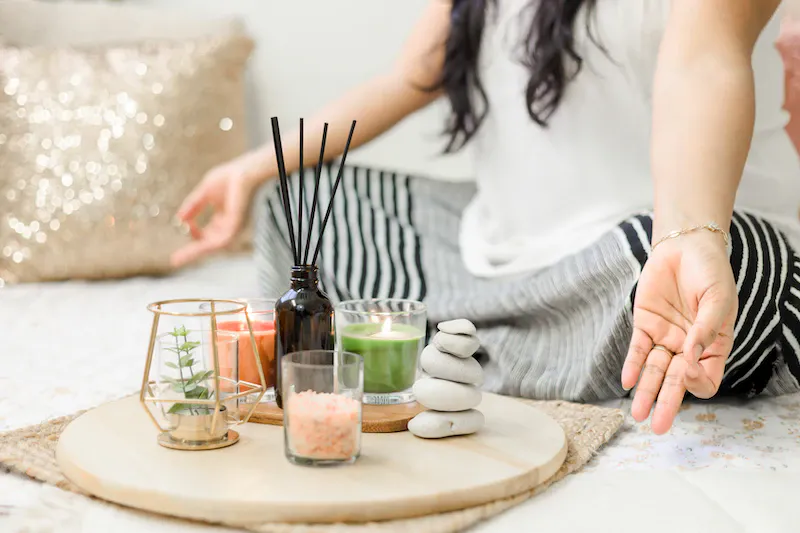Mindful Living: The Power of Meditation and Relaxation

The Importance of Taking Time to Do Nothing
In our fast-paced world, it’s easy to get caught up in the hustle and bustle of daily life. Our minds are constantly racing, and we always seem to be doing something. But when was the last time you took a few minutes to do nothing?
I’m not talking about checking your phone or scrolling through social media. I mean truly doing nothing – no distractions, no TV, no food, no reading. Just being present in the moment.
It’s surprising how difficult this can be for many people. We often take care of our physical appearance, our possessions, and our work, but we neglect to take care of our minds. And yet, our minds are our most valuable resource.
Our minds allow us to experience every moment of our lives. They help us be happy, content, and emotionally stable as individuals, while also enabling us to be kind and considerate in our relationships with others. Our minds allow us to be focused, creative, spontaneous, and perform at our best.
However, when we neglect our minds, we become stressed and overwhelmed. Our thoughts become jumbled and confusing, and we don’t know how to handle them. We become distracted and miss out on the things that are most important to us.
Research shows that on average, our minds are lost in thought almost 47% of the time. This constant mind-wandering is also a direct cause of unhappiness. Spending almost half of our lives lost in thought and potentially unhappy is tragic, especially when there’s something we can do about it.
This is where taking time to do nothing comes in. Just 10 minutes a day can make a significant impact on our mental health and well-being. This practice is commonly known as meditation.
Meditation is not about stopping our thoughts or emotions. It’s about stepping back, observing our thoughts and emotions without judgment, and allowing them to come and go naturally. It’s about familiarizing ourselves with the present moment and learning how to be mindful.
Through meditation, we learn to let go of the patterns of mind that hold us back. We gain a greater appreciation and understanding for the present moment, which allows us to experience a greater sense of focus, calm, and clarity in our lives.
So, take some time to do nothing. Sit in silence, take a walk in nature, or simply enjoy a cup of tea without any distractions. Your mind will thank you for it.
Our Busy Lives: Why We Need to Look After Our Minds
We live in a world where the pace of life is often frantic. Our minds are constantly busy, and we always seem to be doing something. In the midst of our daily hustle, it’s easy to neglect the most important resource we have: our minds.
Our minds are what allow us to experience every moment of our lives. They shape our emotions, thoughts, and actions, and enable us to be happy, content, and emotionally stable as individuals. At the same time, our minds are also responsible for our ability to be creative, focused, and perform at our very best in everything we do.
Unfortunately, many of us don’t take the time to look after our minds properly. We prioritize our physical appearance, our possessions, and our work, but we forget that our mental health is just as important. As a result, we get stressed and overwhelmed, and our minds become jumbled with confusing thoughts and emotions.
We often deal with stress in different ways. Some of us bury ourselves in work as a distraction, while others turn to friends and family for support. However, there are healthier ways to cope with stress. One of these ways is through meditation.
Meditation is a preventative technique that can help us manage our mental health. It teaches us how to be mindful and present in the moment, and how to step back and observe our thoughts and emotions without judgment. Through meditation, we gain a greater appreciation for the present moment, and learn how to be less distracted and more focused in our daily lives.
Taking care of our minds is not just important for our own well-being, but also for the well-being of those around us. When we neglect our minds, we become less kind, less thoughtful, and less considerate towards others. By prioritizing our mental health, we become better partners, friends, and colleagues.
In conclusion, our minds are our most valuable resource. It’s up to us to take care of them properly, so that we can experience the fullness of life with focus, creativity, and joy. Meditation is just one tool that can help us achieve this, but the benefits are immeasurable. So, let’s start taking care of our minds today, and experience the positive impact it has on our lives and those around us.
Meditation as a Preventative Technique
Meditation is often associated with sitting cross-legged on the floor, incense burning, and herbal tea drinking. However, it’s much more than that. Meditation is a scientifically-proven technique that can have a positive impact on our mental health and well-being.
In today’s fast-paced world, we are constantly bombarded with distractions and our minds are always busy. We often feel stressed, overwhelmed, and unable to cope with the demands of our daily lives. This is where meditation can help.
Meditation teaches us how to be present in the moment and to observe our thoughts and emotions without judgment. It allows us to step back and gain a different perspective on the situations we face in life. Through meditation, we learn to focus our minds, become more aware of our surroundings, and develop a greater sense of calm and clarity.
But meditation isn’t just a tool for managing stress. It’s also a preventative technique. By practicing meditation regularly, we can strengthen our minds and become more resilient in the face of challenges. We become better equipped to manage difficult emotions and can prevent them from spiraling out of control.
Research has shown that meditation can have a positive impact on our physical health as well. It can lower blood pressure, reduce anxiety and depression, and improve sleep quality. All of these benefits can have a significant impact on our overall well-being.
Contrary to popular belief, meditation is not about stopping thoughts or controlling the mind. It’s about learning how to be present and mindful, and to observe our thoughts and emotions without getting caught up in them. It’s about learning to let go of negative thought patterns and developing a greater sense of peace and inner calm.
So, if you’re feeling stressed, overwhelmed, or just looking to improve your overall well-being, meditation is a technique worth considering. With just a few minutes a day, you can experience the many benefits that meditation has to offer and strengthen your mind for the challenges of life.
The Present Moment: Understanding Mindfulness
In today’s world, it’s easy to get caught up in our thoughts and worries, and to feel like we’re constantly running on autopilot. We often forget to take a moment to pause and appreciate the present moment. This is where mindfulness comes in.
Mindfulness is the practice of being present in the moment and fully engaged with our surroundings. It involves observing our thoughts and feelings without judgment and without getting caught up in them. It’s about learning to appreciate the small things in life and finding joy in the present moment.
Research has shown that practicing mindfulness can have a positive impact on our mental health and well-being. It can help reduce stress and anxiety, improve mood, and increase feelings of happiness and contentment. It can also improve our ability to focus and make better decisions.
One of the key aspects of mindfulness is learning to let go of distractions and negative thought patterns. By focusing on the present moment, we can let go of worries about the future or regrets about the past. This can help us feel more grounded and centered in our daily lives.
Of course, practicing mindfulness isn’t always easy. Our minds are often racing with thoughts and distractions, making it difficult to stay present in the moment. But with regular practice, we can train our minds to become more focused and attentive.
One way to practice mindfulness is through meditation. By setting aside just a few minutes each day to sit quietly and focus on our breath, we can train our minds to be more present and aware. Over time, we can develop a greater sense of inner calm and clarity.
But mindfulness isn’t just about meditation. It’s about finding small moments throughout the day to pause and appreciate the present moment. It could be as simple as taking a deep breath and looking around at our surroundings, or taking a few moments to savor the taste of our food.
In today’s fast-paced world, it’s easy to get caught up in the hustle and bustle of daily life. But by practicing mindfulness and being present in the moment, we can find greater joy and fulfillment in our lives.
Meditation is Not About Stopping Thoughts, It’s About Stepping Back
Many people believe that meditation is all about stopping thoughts and getting rid of emotions, but this is not entirely true. Meditation is more about stepping back and observing thoughts clearly without any judgment. It’s about learning to witness thoughts coming and going, as well as emotions, without getting caught up in them.
When we sit down to meditate, it’s common to get distracted by a thought or emotion. For example, we may feel anxious and start thinking about our worries. It’s easy to get caught up in the storylines and patterns of our mind. However, through meditation, we can learn to watch our mind in this way, which allows us to let go of these patterns and storylines.
Through meditation, we may also find that we have a restless or dull mind. Some people’s minds are constantly racing, while others have a mechanical, robotic-like thought process. Whatever the case may be, meditation offers the opportunity to step back and gain a different perspective. It helps us realize that things aren’t always as they appear.
Meditation allows us to change the way we experience life. While we can’t always change what happens to us, we can change the way we react to it. Mindfulness gives us the power to see things more clearly and to approach them in a more peaceful manner. By taking just 10 minutes out of our day to familiarize ourselves with the present moment, we can experience a greater sense of focus, calm, and clarity in our lives.
Balancing Focused Relaxation
In life, there are moments when we get too focused and stressed, and it can feel uncomfortable. We might also take our foot off the gas too much and become too relaxed, leading to a lack of productivity. It’s all about finding a balance between focused relaxation, where we can allow thoughts to come and go without getting involved in the usual ways.
When we sit down to meditate, we might notice that our mind is restless, and it might be challenging to stay calm and focused. It’s normal to feel a bit agitated in the beginning, but meditation offers an opportunity to step back and gain a different perspective.
Through meditation, we can learn to let go of our usual storylines and patterns of mind. Instead, we can learn to see things clearly and witness our thoughts and emotions coming and going without judgment. Meditation is not about stopping thoughts or controlling the mind, but about seeing things as they are and learning to be present in the moment.
Finding the right balance between focus and relaxation can be a challenge, but it’s essential for our well-being. We don’t have to sit on the floor or burn incense to practice meditation. All we need is to take ten minutes out of our day to familiarize ourselves with the present moment. This way, we can experience a greater sense of focus, calmness, and clarity in our lives.
Letting Go of Patterns of Mind
Have you ever found yourself getting lost in a particular thought or emotion, unable to shake it off? We all have patterns of mind that we fall into, and sometimes they can be difficult to let go of. Meditation offers a way to step back and observe these patterns without getting caught up in them.
When we sit down to meditate, we may notice that our minds are restless, or we may find ourselves feeling dull and bored. Whatever our experience, meditation provides an opportunity to gain a different perspective and recognize that things aren’t always as they seem. We may not be able to change every little thing that happens to us in life, but we can change the way we experience it.
Meditation teaches us to watch our minds in a non-judgmental way, allowing thoughts and emotions to come and go without getting tangled up in them. It helps us to let go of the storylines and patterns of mind that can hold us back and keep us stuck.
So if you find yourself feeling anxious or overwhelmed by your thoughts and emotions, give meditation a try. Take just ten minutes out of your day to sit and observe your mind, without trying to control or change anything. Over time, you may find that you’re able to let go of old patterns of mind and experience a greater sense of peace and clarity in your life.
The Potential of Meditation and Mindfulness
Meditation and mindfulness are powerful tools that can positively impact various aspects of our lives. By taking a step back from our thoughts and focusing on the present moment, we can reduce stress, increase our sense of well-being, and improve our ability to manage our emotions.
Research has shown that regular meditation practice can lead to physical changes in the brain, including increased gray matter in areas associated with learning, memory, and emotion regulation. Additionally, meditation has been linked to improved sleep, reduced symptoms of anxiety and depression, and enhanced immune function.
Mindfulness, which involves being aware and accepting of our thoughts and feelings without judgment, can also be beneficial. By growing a nonjudgmental attitude, we can increase our self-awareness and become more attuned to our emotions and the impact they have on our behavior.
Incorporating meditation and mindfulness into our daily routine can be challenging, but the potential benefits make it well worth the effort. Starting with just a few minutes a day and gradually increasing the duration and frequency of practice can help make it a sustainable habit.
Overall, meditation and mindfulness offer a range of potential benefits for our mental and physical health. By making these practices a regular part of our lives, we can grow greater peace, focus, and toughness.
Conclusion
In conclusion, the practice of meditation and mindfulness has numerous benefits for our mental and physical well-being. By taking the time to slow down and focus on the present moment, we can reduce stress, improve cognitive function, and grow a greater sense of calm and clarity in our daily lives. While meditation can initially seem daunting, it’s important to remember that there is no right or wrong way to do it. The key is to approach the practice with an open mind and a willingness to let go of expectations and judgments. With consistent practice and patience, we can all develop the ability to be more present and mindful in our daily lives, and enjoy the many benefits that come with a calm and focused mind. So why not take a few moments each day to simply be present and observe your thoughts and feelings without judgment? You might just be surprised at how transformative the experience can be.




